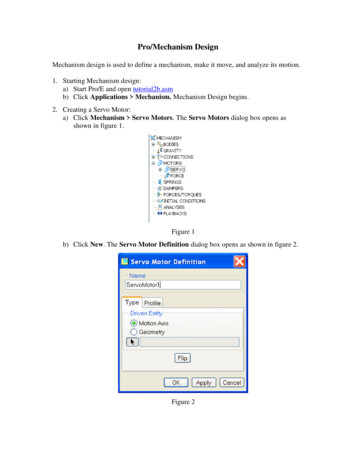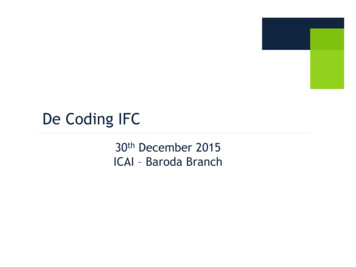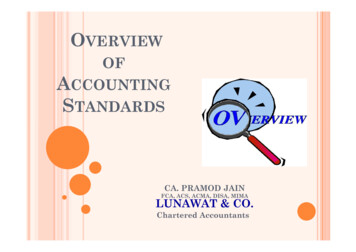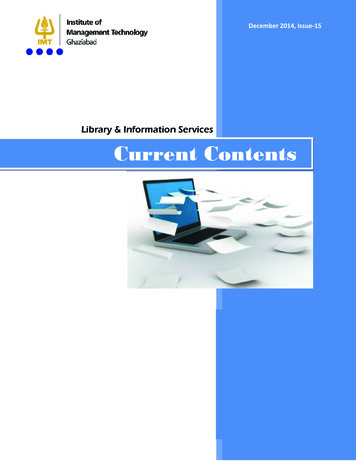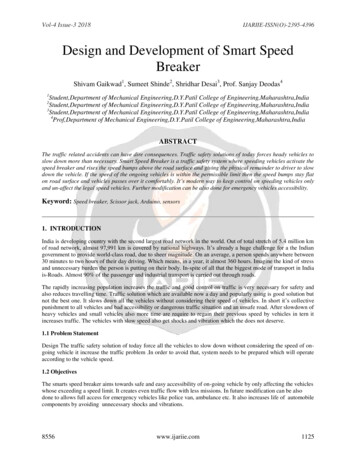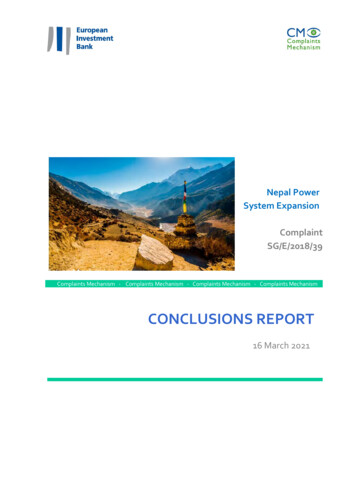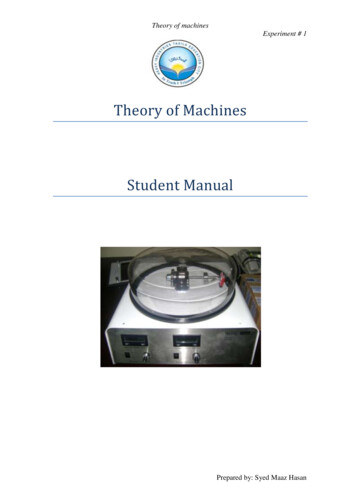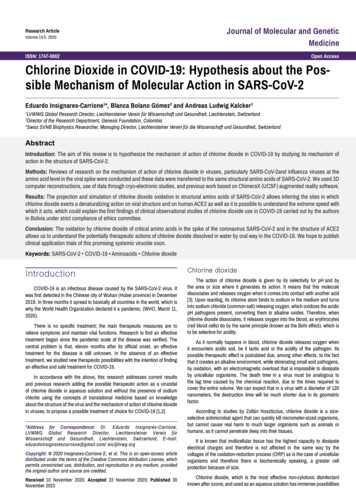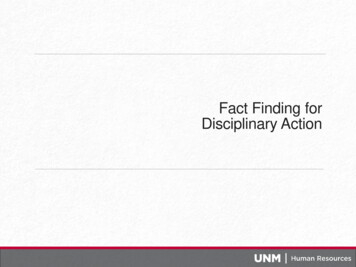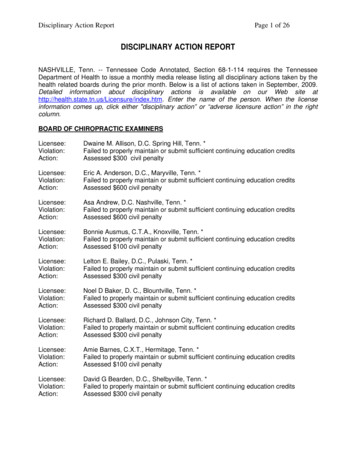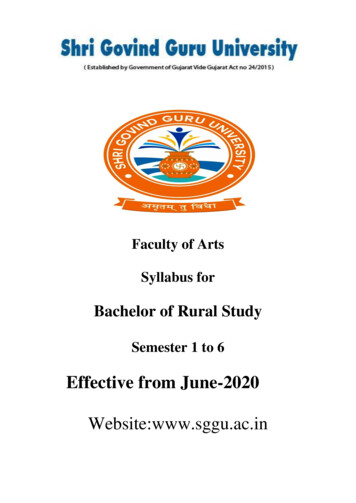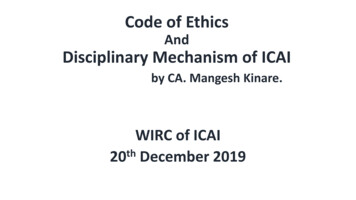
Transcription
Code of EthicsAndDisciplinary Mechanism of ICAIby CA. Mangesh Kinare.WIRC of ICAIth20 December 2019
Code of Ethics ICAI being member of International Federation of Accountants (IFAC) has considered the Ethicsstandards issued by International Ethics Standards Board for Accountants(IESBA) while framingCode of Ethics for CAs.The existing (2009) edition of ICAI Code of Ethics is based on 2005 edition of IESBA Code of Ethics.ICAI Code of Ethics has been revised in January, 2019 based on 2018 edition of IESBA Code ofEthics. It is applicable from 1st April, 2020.Existing Code of Ethics contains Two PartsPart-A - [Based on IFAC/IESBA Code of Ethics, 2005 edition]Chapter 1 – General application of the CodeChapter 2 - Professional Accountants in public practiceChapter 3 – Professional Accountants in servicePart –B - [Based on domestic Indian provisions ]Chapter 4 – Accounting and Auditing standardsChapter 5 – The Chartered Accountants Act, 1949Chapter 6 – Council GuidelinesChapter 7 – Self Regulatory Measures Recommended by the CouncilAppendices A – F
General Application of Code – Fundamental PrinciplesA professional accountant is required to comply with the following fundamentalprinciples:(a) Integrity – Being straightforward and honest in all professional relationships.(b) Objectivity – Not allow bias, conflict of interest or undue influence of others tooverride professional judgments.(c) Professional Competence and Due Care – Maintain professional knowledge andskill at the level required to ensure that a client or employer receives competentprofessional service based on current developments in practice, legislation andtechniques(d) Confidentiality – The confidentiality of information acquired - should notdisclose any such information to third parties without proper and specific authorityunless there is a legal or professional right or duty to disclose. Confidentialinformation acquired as a result of professional and employment relationshipsshould not be used for the personal advantage of the professional accountant orthird parties.(e) Professional Behaviour – Should comply with relevant laws and regulations andshould avoid any action that discredits the profession.
Threats in Compliance of Fundamental Principles(a) Self-interest threats, which may occur as a result of the financial or otherinterests of a professional accountant or of a relative(b) Self-review threats, which may occur when a previous judgment needs tobe re- evaluated by the professional accountant responsible for thatjudgment(c) Advocacy threats, which may occur when a professional accountantpromotes a position or opinion to the point that subsequent objectivitymay be compromised(d) Familiarity threats, which may occur when, because of a relationship, aprofessional accountant becomes too sympathetic to the interests ofothers(e) Intimidation threats, which may occur when a professional accountantmay be deterred from acting objectively by threats, actual or perceived.
Safeguards for the Threats(A) Safeguards created by the profession, legislation or regulation include,but are not restricted to:(a) Educational, training and experience requirements for entry into theprofession.(b) Continuing professional development requirements.(c) Corporate governance regulations.(d) Professional standards.(e) Professional or regulatory monitoring and disciplinary procedures.(f) External review by a legally empowered third party of the reports, returns,communications or information produced by a professional accountant.
Safeguards for the Threats(B) Safeguards in the work environment – Firm wide safeguards :-Compliance with the fundamental principles.Act in the public interest.Documented Policies and procedures :- To implement and monitor quality control of engagements.- Regarding the identification of threats.- Identification and the application of safeguards.- For assurance engagements - documented independence policies.- Requiring compliance with the fundamental principles.- To enable the identification of interests or relationships between the firm or membersof engagement teams and clients.- To monitor and manage the reliance on revenue received from a single client.- For Using different partners and engagement teams with separate reporting lines- To prohibit individuals who are not members of an engagement team frominappropriately influencing the outcome of the engagement.
Safeguards for the Threats-Timely communication of a firm’s policies and procedures, including any changes tothem, to all partners and professional staff, and appropriate training and educationon such policies and procedures.Designating a member of senior management to be responsible for overseeing theadequate functioning of the firm’s quality control system.Advising partners and professional staff of those assurance clients and relatedentities from which they must be independent.A disciplinary mechanism to promote compliance with policies and procedures.Published policies and procedures to encourage and empower staff to communicateto senior levels within the firm any issue relating to compliance with thefundamental principles that concerns them.
Safeguards for the ThreatsEngagement-specific safeguards in the work environment may include:- Involving an additional professional accountant to review the work done or otherwise adviseas necessary.- Consulting an independent third party, such as a committee of independent directors, aprofessional regulatory body or another professional accountant.- Discussing ethical issues with those charged with governance of the client.- Disclosing to those charged with governance of the client the nature of services provided andextent of fees charged.- Rotating senior assurance team personnel.Safeguards within the client’s systems and procedures may include:- When a client appoints a firm in public practice to perform an engagement, personsother than management ratify or approve the appointment.- Competence of Client’s employees with experience & seniority to make managerial decisions.- The client has implemented internal procedures that ensure objective choices incommissioning non assurance engagements.- The client has a corporate governance structure that provides appropriate oversight andcommunications regarding the firm’s services.
Application of Conceptual Framework by ProfessionalAccountants in Public Practice in Important Circumstances Professional Appointment Client Acceptance - Council Guidelines on KYC for Clients. Engagement Acceptance – Whether engagement can be accepted ? Changes in a Professional Appointment – Communication with previous Auditors. Conflicts of Interest – Undertaking engagements in competing Clients or havinginterest in competing entity. Second Opinions – Overdependence leading to compromising objectivity andprofessional competence. Fees and Other Types of Remuneration – Excessive Fees from single client or theirGroup. Marketing Professional Services Gifts and Hospitality Custody of Client Assets
Application of Conceptual Framework by ProfessionalAccountants in Service in Important CircumstancesPotential ConflictsPreparation and Reporting of InformationActing with Sufficient ExpertiseFinancial InterestsInducements
Major Changes in Code of Ethics 2019Five most important structural changes in new Code Independence requirements for Audit and Review Engagements and other Assuranceengagements differentiated Independence sections recharacterized as “International Independence Standards” Change in the drafting conventions e.g. “should” to “shall” New pattern of structuring of sections – Requirements distinguished Increased clarity of responsibility for compliance - Firms, network firms, individuals within firmsChanges from IESBA CodeChanges made fall under following broad heads: Where domestic provision stricter than corresponding IESBA provision e.g. total bar onAccounting by the Statutory Auditor Where domestic legal requirement governs the issue e.g. “Network” would only refer toNetwork registered with ICAI Where a domestic requirement has no corresponding provisions in IESBA Code e.g. FirmRotation Language changes – for example, “professional accountant in business” mentioned as“professional accountant in service” as per Chartered Accountants Act, 1949
Overview of the structure of new Code of Ethics i.e 2019Part 1 (Applicable to all Professional Accountants)Complying with the Code, Fundamental Principles and Conceptual FrameworkPart 2Professional Accountants in BusinessPart 3Professional Accountants in Public PracticeInternational Independence Standards (Parts 4A & 4B)Part 4A—Independence for Audits & Reviews (Sections 400 to 899)Part 4B—Independence for Other Assurance Engagements (Sections 900 to 999)Glossary (All Professional Accountants)
Major Changes in Code of Ethics 2019Non-Compliance with Laws and Regulations (NOCLAR) While providing a professional service to a client or for an employer, a Professional Accountantmay come across an instance of non-compliance with laws and regulations (NOCLAR) or suspectedNOCLAR committed or about to be committed by the client or the employer, or by those chargedwith governance, management or employees of the client or employer. Accepting that Professional Accountant has a prima facie ethical responsibility to not turn a blindeye to the matter, NOCLAR was introduced to guide him to deal with the situation consideringhow best to serve the public interest in these circumstances. Laws and regulations having nexus to PAs’ professional training and expertise, i.e.: Having direct effect on the determination of material amounts and disclosures in the financial statementsCompliance of which fundamental to the entity’s businessCompliance necessary to avoid material penalties. As per IESBA, following examples would be covered in NOCLAR: Fraud, corruption and bribery, Money laundering, terrorist financing and proceeds of crimeSecurities markets and trading, Banking and other financial products and servicesData protection, Environmental protection, Public health and safetyTax and pension liabilities and payments
Major Changes in Code of Ethics 2019Non-Compliance with Laws and Regulations (NOCLAR) contd. Following matters not in scope of NOCLAR: Clearly inconsequential Personal misconduct unrelated to the business activities Non-compliance other than by the client or employer PA to address NOCLAR only when, and if, he encounters the same in the course of providing aprofessional service to a client In 2019 Code, it has been initially made applicable to Auditors/Employees of Listed entities inIndia.Independence Standards 2009 Code contains Section 290 (“Independence – Assurance Engagements”) 2019 edn. based on 2018 IESBA Code introduces Parts 4A /4B :Part 4A : Independence for Audit and Review EngagementsPart 4B : Independence for Assurance Engagements other than Audit and Review 4A and 4B christened as “Independence Standards”, as against “Section” earlier.
Major Changes in Code of Ethics 2019Taxation services to the Audit clients ICAI Code Ethics, 2009 : Taxation to Audit client include compliance, planning, provision of formaltaxation opinions and assistance in the resolution of tax disputes. Such assignments are generally notseen to create threats to independence ICAI Code of Ethics, 2019 (604) : Further guidance on Taxation matters provided. Generally, it statesthat providing tax services to an audit client might create a self review or advocacy threat – Tax Return preparation – Usually no threat Tax Calculations for the Purpose of Preparing Accounting Entries (that will subsequently beaudited by the Firm) - Creates a self-review threat Tax Planning /Other Tax Advisory Services - Might create self-review/advocacy threat- appropriatesafeguards to be adopted, E.g. Using professionals who are not audit team members to performthe service; having an appropriate reviewer, not involved in providing the service, review the auditwork etc. Tax Services Involving Valuations- Might perform only where the result of the valuation will nothave a direct effect on the financial statements Assistance in the Resolution of Tax Disputes - Might create a self- review or advocacy threat –appropriate safeguards to be adopted – Not to provide if involves acting as advocate for the auditclient OR amounts involved are material to the financial statements on which the firm will express
Major Changes in Code of Ethics 2019Documentation 2009 Code requires Firms to document their conclusions regarding compliance with independencerequirements In the 2019 Code, the requirements of Documentation given in greater detail NOCLAR requires all steps in responding with NOCLAR to be documentedFees – Relative Size In the revised Code, where for two consecutive years, total gross annual professional fees from the auditclient and its related entities represent more than 15% of total fees, the firm shall disclose to Those chargedwith Governance (TCWG) No such ceiling on total fees of the Firm would be applicable where such fees does not exceed Rs. 5 Lakhs No such ceiling on the total fees would be applicable in the case of audit of government Companies, publicundertakings, nationalized banks, public financial institutions or Government appointments.Criteria of Indebtedness IESBA Code of Ethics, 2018 brought concept of materiality of Loans and Guarantees. Whether a loan orguarantee is material would depend on combined net worth of the individual and his immediate family members Concept adopted in ICAI Code of Ethics, 2019(The Chapter X of Council General Guidelines , 2008 proposed to be repealed with revision of Part-B of Code ofEthics)
Major Changes in Code of Ethics 2019-In the revised Code, the application of safeguards is required, when necessary, to eliminate threats or toreduce them to ‘an acceptable level’ (level which a reasonable and informed third party would conclude,is acceptable). Previously safeguards had to be considered if a threat was other than “clearly insignificant”Public Interest Entity 2019 edition contains a new term “Public Interest Entity” (PIE) Enhanced independence requirements for PIE in the new Code Definition of PIE , as given in IESBA Code of Ethics extended by inclusion of banks and insurance companiesin the 2019 Code Firms encouraged to determine whether to treat an additional entities as PIE because of large number ofstakeholders.Inducements - Gifts and Hospitality Inducements elaboratedTo first see whether prohibited by Laws and RegulationsOffering also prohibitedReasonable and Informed Third Party test – To see whether it is with the intent to improperly influence thebehavior of the recipient or of another individual. Clarifications about appropriate boundaries for offering and accepting of inducements Extended to PAs in service also Total prohibition in case of Audit/Assurance clients to continue
Part B Accounting and Auditing Standards Statements , Standards and Guidance Notes. The Chartered Accountants Act, 1949 – Relevant Provisions Members who are deemed to be in practiceSignificance of the certificate of PracticeA Member in practice is prohibited from using a designation other than CharteredAccountant.Disabilities for purpose of MembershipRemoval from the RegisterProcedure in Inquiries for Disciplinary Matters relating to misconduct of the members ofthe InstituteConduct of the members in any other CircumstancesPenalty for falsely claiming to be a Member etc.Companies not to engage in accountancyUnqualified persons not to sign documentsMaintenance of Branch OfficesProcedure with regard to noting by the Institute of retirement of Partner(s) of a firm
Quality Assurance Mechanism in ICAI Quality Review Board (QRB)- Set up by Section 28A of CA Act.- Consists of 11 Members. Chairperson and 5 members nominated by Govt.- 5 Members nominated by Council.- To Review quality of services by members, recommendations to ICAI, Guidance to members.- QRB Team can visit Firms. Financial Reporting and Review Board (FRRB)- Non Standing Committee of ICAI.- Only Council Members. No co-opted members.- Review of Financial Reporting by Members, recommendations to ICAI, Guidance to members- Review on the basis of published accounts and additional documents, if required. Peer Review Board (PRB)- Non Standing Committee of ICAI.- To ensure that in carrying out the assurance service assignments, the members(a) comply with Technical, Professional and Ethical Standards including other regulatory requirements(b) have in place proper systems including documentation thereof.- Members appointed by Board as Reviewers- visit practice units and carry out Review.- Certificate issued after satisfactory completion of Review. Taxation Audits Quality Review Board - New Non standing Committee formed to perform Review of Taxation Audit reports in line with FRRB.
Disciplinary Authorities in ICAI Disciplinary Directorate ( Section 21) Headed by an officer of the Institute designated as Director (Discipline) Employees for making investigations in respect of any information or complaint received by it.Board of Discipline ( Section 21A ) President or the Vice-President of the Council as the Presiding Officer One Elected Council Member Person of eminence having experience in the field of law, economics, business, finance or accountancynominated by Govt.Disciplinary Committee ( Section 21B ) Presiding Officer appointed by Council - person with experience in law and having knowledge ofdisciplinary matters and the profession (President, Vice President or Senior Council Member) Two Elected Council Members Two members to be nominated by the Central Government from amongst the persons of eminencehaving experience in the field of law, economics, business, finance or accountancy The Council may constitute more Disciplinary CommitteesAppellate Authority ( Section 22A ) Central Government shall, by notification, constitute an Appellate Authority. A person who is or has been a judge of a High Court, to be its Chairperson Two members to be appointed from amongst the persons who have been members of the Council for atleast one full term and who is not a sitting member of the Council. Two members to be nominated by the Central Government from amongst persons having knowledge andpractical experience in the field of law, economics, business, finance or accountancy
Part B Part – I of The First Schedule :Professional Misconduct in relation to Chartered Accountants in practiceA Chartered Accountant in practice shall be deemed to be guilty of professional misconduct, ifhe:-Clause (1): Allowing Non CA to practice in his name :allows any person to practice in his name as a chartered accountant unless such personis also a chartered accountant in practice and is in partnership with or employed by him;- To safeguard the public against unqualified accountants.- Duty of Members not to allow such persons to practice, if in their knowledge.
Part B Part – I of The First Schedule :Clause (2): Sharing Fees or Profits with Non CAs:pays or allows or agrees to pay or allow, directly or indirectly, any share, commission orbrokerage in the fees or profits of his professional business, to any person other than - a member of the Institute or a partner or a retired partner or- the legal representative of a deceased partner, or- a member of any other professional body or- with such other persons having such qualifications as may be prescribed, for the purposeof rendering such professional services from time to time in or outside India.Explanation: In this item “partner” includes a person residing outside India with whom achartered accountant in practice has entered into partnership which is not in contravention ofitem (4) of this part- Regulation 53(A) – Other Professional Bodies- ICSI, ICWAI, Bar Council, Indian Institute of Architects,Indian Institute of Actuaries. Persons Qualified- BE, B.Tech, LL.B., M.B.A. from recognised University.- Goodwill of the Proprietary Concern can be sold/transferred to another eligible member after thedeath of the Proprietor.
Part B Part – I of The First ScheduleClause (3): Receiving Share in Profits from Non CAaccepts or agrees to accept any part of the profits of the professional work of a person who isnot a member of the Institute; Provided that nothing herein contained shall be construed asprohibiting a member from entering into profit sharing or other similar arrangements,including receiving any share commission or brokerage in the fees, with a member of suchprofessional body or other person having qualifications, as is referred to in item (2) of this Part;Clause (4): Entering in Partnership with Persons other than CAs in practice :enters into partnership, in or outside India, with any person other than a chartered accountantin practice or such other person who is a member of any other professional body having suchqualifications as may be prescribed, including a resident who but for his residence abroadwould be entitled to be registered as a member under Clause (v) of sub-Section (1) of Section 4or whose qualifications are recognised by the Central Government or the Council for thepurpose of permitting such partnershipsPersons Qualified- CS, CWA, Actuary, Architect, Advocate, BE, B.Tech, M.B.A. from respective recognisedInstitutions / University. However, Multi Disciplinary Partnerships not approved by Institute.
Part B Part – I of The First ScheduleClause (5): Securing Professional Business by non permitted means :secures, either through the services of a person who is not an employee of such charteredaccountant or who is not his partner or by means which are not open to a charteredaccountant, any professional business:Provided that nothing herein contained shall be construed as prohibiting any arrangementpermitted in terms of items (2), (3) and (4) of this Part;Clause (6): Solicitation of Professional Work :solicits clients or professional work either directly or indirectly by circular, advertisement,personal communication or interview or by any other means; Provided that nothing hereincontained shall be construed as preventing or prohibiting—(i) any chartered accountant from applying or requesting for or inviting orsecuring professional work from another chartered accountant in practice;(ii) a member from responding to tenders or enquiries issued by various users ofprofessional services or organisations from time to time and securing professional workas a consequence;
Part B Part – I of The First ScheduleClause (6): Solicitation of Professional Work :Important Guidelines/ Announcements Advertisement Guidelines published in November, 2009 Journal. Website Guidelines issued by Council. Restriction on manner of entries in Directories. Council Guidelines for responding to Tenders issued on 7th April, 2016Issues: Press Advertisement for changes in partnership, address etc., giving actual facts- Allowed. Giving Public interviews; may be mentioning details about him/ his firm, not leading toAdvertisement - Allowed. (should not highlight professional attainments). Publication of Books or Articles – Allowed – Association with CA firm can not be disclosed. Greeting Cards, Invitations- Generally allowed.
Part B Part – I of The First ScheduleClause (7): Advertisement of Professional and Other Achievements :advertises his professional attainments or services, or uses any designation or expressionsother than chartered accountant on professional documents, visiting cards, letter heads orsign boards, unless it be a degree of a University established by law in India or recognised bythe Central Government or a title indicating membership of the Institute of CharteredAccountants of India or of any other institution that has been recognised by the CentralGovernment or may be recognised by the Council;Provided that a member in practice may advertise through a write up, setting out the servicesprovided by him or his firm and particulars of his firm subject to such guidelines as may beissued by the Council; ICAI Diploma can be mentioned on card; not certificate course. Eg. Descriptions like ‘ President of Rotary Club’ etc. should not be used on Professional stationery. Guidelines on Advertisement by Write ups 14th May, 2008. Write ups should not be claimingsuperiority , not be indecent, sensational, should not contain testimonials or endorsements, shouldnot include the names of the clients, font size not more than 14, should not contain any informationabout achievements/award or any other position held.
Part – I of The First SchedulePart BClause (8): Non Communication with Previous Auditor :accepts a position as auditor previously held by another chartered accountant or a certifiedauditor who has been issued certificate under the Restricted Certificate Rules, 1932 withoutfirst communicating with him in writing; Applicable to all types of audits. Communication by hand Delivery with Acknowledgement or Registered AD Post only allowed. Position previously held by CA (and not previous year’s CA) for same or similar assignmentcomprising same/similar scope.Council General Guidelines, 2008A member of the Institute in practice shall not accept the appointment as auditor of an entityin case the undisputed audit fee of another Chartered Accountant for carrying out thestatutory audit under the Companies Act, 1956 or various other statutes has not been paid:Provided that in the case of sick unit, the above prohibition of acceptance shall not apply.Explanation 1: For this purpose, the provision for audit fee in accounts signed by both - the auditee andthe auditor shall be considered as “undisputed” audit fee.Explanation 2:For this purpose, “sick unit” shall mean where the net worth is negative.It will be Mis-conduct as per Clause 1, Part-II of Second Schedule.
Part B Part – I of The First ScheduleClause (9): Accepting Audit Appointment without ascertaining Company Law compliance :accepts an appointment as auditor of a company without first ascertaining from it whether therequirements of Section 225 of the Companies Act, 1956 (1 of 1956), in respect of suchappointment have been duly complied with;Council Guidelines: Ensure that the notice was properly served on the members & outgoing auditors. Obtaining copy minutes duly verified & signed by Chairman.Clause (10): Charging Fees on the basis of Percentage or Contingencies :charges or offers to charge, accepts or offers to accept in respect of any professionalemployment, fees which are based on a percentage of profits or which are contingent uponthe findings, or results of such employment, except as permitted under any regulation madeunder this Act; - Ref. Regulation 192: Receiver, Liquidator- Realisation of Assets, Valuer-Value of Asset, Debt Recovery Services- Amount ofDebts recovered, Cost optimisation Services- Benefits derived. Auditor of Co-op. Societies- Working Capital , Gross/Net Profit. Any other Service or Audit as may be decided by the Council.
Part B Part – I of The First ScheduleClause (11): Engaging business/occupation other than CA :engages in any business or occupation other than the profession of chartered accountantsunless permitted by the Council so to engage: Provided that nothing contained herein shalldisentitle a chartered accountant from being a director of a Company, (not being a managingdirector or a whole time director), unless he or any of his partners is interested in suchcompany as an auditor;Regulation 190 A & Appendix 9 to CA Regulations, 1988. ( Illustrative list)General Permission Employment with CA Firm, Private Tutorship, Author of Books & Articles, Holding Public Offices likeMLA/MP etc., Honorary Office bearer in Charitable, Educational or Other Non Profit Organisation,Notary, SEM, Valuation of Papers, Paper setters, Examiners etc., part time tutor in coachingorganisation of Institute, Editorship of Professional Journals. Acting as Loss Surveyor under Insurance Act, Recovery consultant in Banks. Owning Agricultural land and carrying agricultural activity.Special Permission : Lecturer in University/Colleges- Total direct teaching hours should not exceed 25 hours. Editorship other than Prof Journals, Mg. Director, Whole time Director of Company with no interest.
Part – I of The First SchedulePart BClause (12): Allowing Persons other than practicing CA to sign on his behalf:allows a person not being a member of the Institute in practice, or a member not being hispartner to sign on his behalf or on behalf of his firm, any balance- sheet, profit and lossaccount, report or financial statements.Council Clarification: Delegation allowed where professional opinion/authentication not required – Issue of AuditQueries, Forwarding Observations , Asking information etc. during Audit.Part – II of The First Schedule :Professional Misconduct in relation to Chartered Accountants in ServiceA member of the Institute (other than a member in practice) shall be deemed to be guilty ofprofessional misconduct, if he being an employee of any company, firm or person —Clause (1): Sharing Emoluments :pays or allows or agrees to pay directly or indirectly to any person any share in the emoluments of theemployment undertaken by him;Clause (2): Accepting part of Fees etc from Professional engaged by employer company :-accepts oragrees to accept any part of fees, profits or gains from a lawyer, a chartered accountant or brokerengaged by such Company, firm or person or agent or customer of such Company, firm or person byway of commission or gratification;
Part B Part – III of The First Schedule :Professional Misconduct in Relation to Members of the Institute GenerallyA member of the Institute, whether in practice or not, shall be deemed to be guilty ofprofessional misconduct, if he:Cla
(b)Continuing professional development requirements. (c) Corporate governance regulations. (d)Professional standards. (e) Professional or regulatory monitoring and disciplinary procedures. (f) External review by a legally empowered third party of the reports, returns, communications or information produced by a professional accountant.
